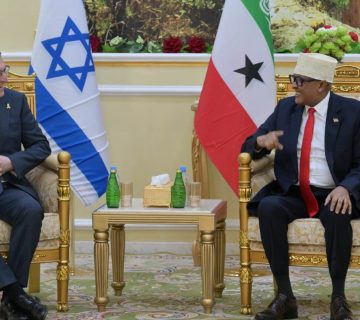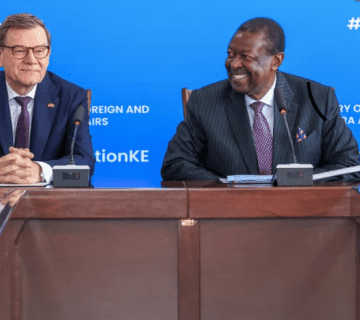The new agreement between the Federal Government of Somalia and Somalia’s Federal Member States which concluded late last month is one of the most significant milestones of stabilizing both the democratic process and the country’s security. The agreement comes after a major relapse alert that came with fractures in Somalia’s armed forces and police and violent clashes in Mogadishu between pro-government forces against opposition forces and militia. The previous failed attempts to hold elections per the October 17, 2020 election agreement and the incumbent president’s move to extend his term beyond its constitutional expiry on February 08, 2021, sparked off the clashes that would have rolled back stabilization gains and marked the beginning of yet another state collapse after 30 years of instability.
The New Agreement
At the center of the new political agreement, are electoral reforms and political concessions necessary for delivering the elusive elections in just 50 days. First, the Prime Minister will play a central role in steering the country’s elections and resolving the stand-off in the country’s Gedo region. The Prime Minister’s prominent role is a backstop following the stalemate occasioned by mutual exclusivity of the presidency and the opposition in the political process which the incumbent president is accused of attempting to manipulate for his re-election. The agreement will now require elections to be held in one city for every federal member state by a reduced number of delegates for logistical practicality, and has laid out electoral reforms pegged on the restructuring of the election management teams to expand the role of the federal member states in managing elections and to guarantee transparency and credibility of the polls. New members of the federal and regional election teams will be appointed following nominations from federal member states and the federal government to replace teams unilaterally appointed by the president. Women’s participation has further been secured in the agreement, through a 30 per cent quota which will increase the number of women in the federal parliament.
International Community’s Role
While the political talks to reach the new agreement were mainly Somali-led, the international community has played a pivotal role in pushing the main political stakeholders away from brinksmanship back to talks, and the security sector actors away from streets back to the barracks to restore structure and command. The international community should now expand its role in Somalia to firm up the new agreement and provide technical, material and political support to the full implementation of the agreement to avoid any missteps that sunk the September 17, 2020 agreement and guarantee transparency and credibility of the polls.
However, to achieve sustainable stability in Somalia, the international community should go beyond supporting the electoral process to focus development support towards constitution-making to stabilize the federal system and establish a stable framework for the rule of law. Somalia’s provisional constitution which was drafted in 2012 is incomplete and its own gaps and inconsistencies are a source of conflict especially between the two levels of government in the context of federalism. Constitutional gaps inadvertently permit arbitrary governance practices and leave the country’s larger framework of the rule of law to otherwise weak institutions of parliament, the judiciary and an authoritarian executive. The international community should further support the process of building stronger democratic institutions and processes to provide robust safeguards against authoritarianism and arbitrary governance. Currently, institutions such as parliament and the judiciary in Somalia are weak and suffer gross incapacity to restore the separation of powers and the system of checks and balances, as well as an incapacity to fill relevant legal and constitutional gaps. Such context of institutional incapacity allows the executive to overstep and lay siege on democratic institutions and processes thus creating a recipe for relapse into chaos.
The Security Sector Reform
The thin line of separation between organized democratic politics and warlordism in Somalia is the ability of the security sector to exercise discipline, professionalism and duty to the constitution above narrow political objectives. However, the thin line is blurred and remains under constant threat from warlords within its ranks, in the mainstream political circles and other militants. Serious risks to the security sector in Somalia include the lack of capacity to ably play its defence and security roles, the lack of professionalism, discipline, as well as clear and robust structure and command. The international community should thus devote efforts and resources towards the security sector reform program in Somalia to help professionalize it and institutionalize processes and procedures through training, equipment, structuring and doctrinal entrenchment.
The Threat of External Influence
While there is a strategic need for the international community to become more actively involved in Somalia’s stabilization and reconstruction, the growing influence of geopolitical rivalry and competition among foreign powers in Somalia threaten the credibility and effectiveness of strategic engagement for Somalia’s stability and growth. In view of the danger posed by foreign powers pushing zero-sum geopolitical games in Somalia, structured and institutional mechanisms should be developed to support the international community’s role in Somalia.
Somalia’s progress thus far is a collective effort and investment by the regional and international community to ending the country’s decades-long instability. As such, it remains the responsibility of the international community to remain actively engaged in Somalia’s stabilization beyond elections to investments in actual pillars of stability if any relapse is to be avoided in long-term.
Edmond Pamba is a Researcher at the HORN Institute
Photo Credit: A partnership meeting between Germany and the United Nations in Somalia in 2019 (Photo Credit: UNSOM)
The contents of this article are copyright of © The HORN Institute 2022. All rights reserved. Any redistribution or reproduction of part or all of the contents in any form and for whatever reason is prohibited. You may use the content of this article for personal reasons, but acknowledge the website as the source of the material.



